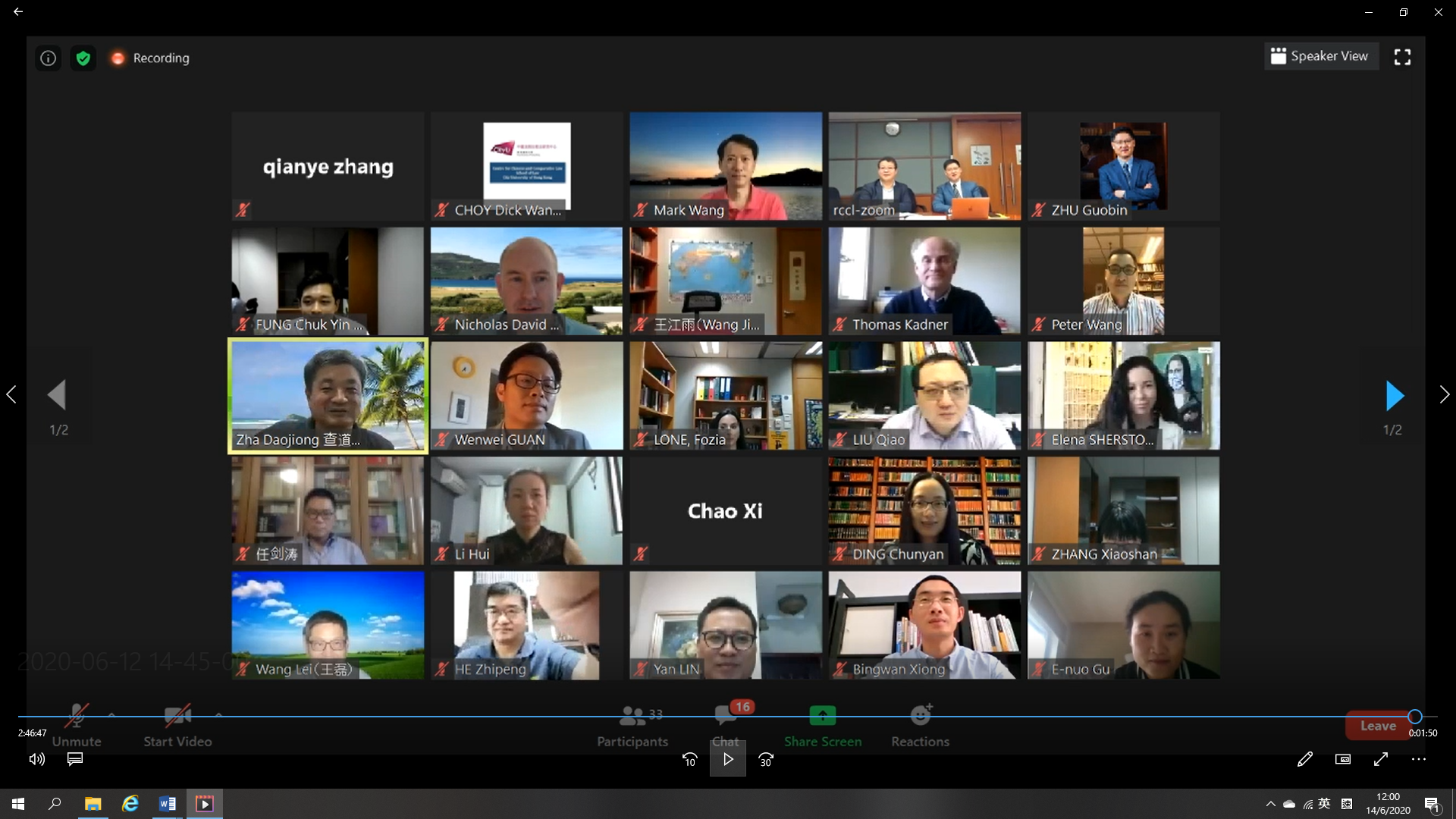Latest News
RCCL & CPLR Online Symposium: International Symposium on COVID-19 and Models of Governance in East Asia and the World (12 June 2020)
The novel coronavirus, now officially known as COVID-19, which first broke out in China’s Wuhan in December 2019 and later developed into a pandemic, has up to now ravaged the whole world for almost half year. While there sees some regression of the pandemic internationally, legal, social and political issues and challenges posed by COVID-19 have just begun to be seen and felt in many jurisdictions internally and globally.
With the success of our online workshop on 22 May 2020 which focused on discussing the impacts of COVID-19 on international law, international relations and international order, on 12 June 2020, in collaboration with our sister research centre — the Public Law and Human Rights Forum (CPLR) of the School of Law of City University of Hong Kong — the Centre for Chinese and Comparative Law (RCCL) held another online symposium to discuss issues relating to national and regional governance, especially in East Asia, arisen as a result of the COVID-19 pandemic, including the impacts of governments’ responses to COVID-19 on the rule of law and rights protection (e.g. right to live, freedom of speech, privacy, freedom of information, etc.); the implications of COVID-19 on trade and economics; emergency law and public health policy in times of pandemic; and the responses of different jurisdictions and different governance models to COVID-19 and their lessons.
The Symposium started with the opening remarks by the Associate Dean of the School of Law Prof. Wan Wai Yee who thanked all the speakers for their participation, and then followed by the Directors of the two organizing institutions — namely Prof. Wang Jiangyu, Director of RCCL and Prof. Zhu Guobin, Director of CPLR — who introduced the purpose of this online Symposium.
After that, we had 21 both informative and thought-provoking presentations on the following four sub-themes: 1) Rights protection and health governance in China; 2) Economic and legal issues relating to COVID-19 in China; 3) A comparative study of different jurisdictions’ responses to COVID-19 and the challenges of the pandemic to state governance; and 4) The impacts of COVID-19 on global governance.
While COVID-19 related issues and phenomena are new to everyone, many of the scholars and experts in the world (including our Symposium speakers) have been following closely the relevant development and conducting in-depth studies on the relevant issues. Notwithstanding that their research may still be at the preliminary stage given the time constraint, our speakers’ generosity in sharing their preliminary findings and research output at the Symposium are instrumental in providing important information to the Symposium participants and laying a useful foundation for further academic exchange and research.
The interactions between the audience and the speakers during the Q&A sessions were equally interesting: while the audience putting forward critical and acute comments and follow-up questions relating to speakers’ presentations, the speakers enthusiastically responding to those challenges.
The Symposium came to an end with the conclusion and vote of thanks by the Directors of the two hosting research centres.
COVID-19 is an unprecedented pandemic and issues arisen from it are also unprecedentedly challenging to individual jurisdictions and the world as a whole, which definitely could not be thoroughly covered in two conferences. Thus, RCCL will certainly continue to explore opportunities to organize similar academic activities to provide a platform for further academic exchange on this important cutting edge topic.
This Symposium is a research output-oriented event, some of the papers presented at this Symposium will be blinded reviewed and published in a special issue of an international comparative law journal. Besides, based on the substance and spirit of the speakers’ presentations, RCCL and CPLR will also jointly publish a bilingual policy report on COVID-19 and East Asian Governance Models.

中國法與比較法研究中心及公法與人權論壇聯合主辦 “新冠肺炎疫情與東亞治理模式”網上國際研討會 (2020年6月12日)
新冠肺炎首先於2019年12月在中國武漢爆發,及後迅速蔓延至不同國家和地區,並成為世界性瘟疫,蹂躪全球至今已近半年之久。雖然最近疫情在各國似有稍為緩和跡象,但由這個疫癥引發的法律、社會及政治問題卻剛開始逐漸浮現,並對很多國家和地區的政府管治,以至全球治理構成重大挑戰。
2020年5月22日,香港城市大學(以下簡稱“城大”)法律學院中國法與比較法研究中心 (以下簡稱“RCCL”)首先就新冠肺炎疫情成功舉行了一場網上座談會,主要討論新冠肺炎對國際法、國際關係和國際秩序的影響。在該座談會的基礎上,RCCL聯同同為香港城市大學法律學院轄下的另一個研究中心 — 公法與人權論壇 (Public Law and Human Rights Forum, 以下簡稱“CPLR”) — 於2020年6月12日舉行了另一場關於新冠肺炎的網上研討會,集中討論由疫情引起的政府管治、區域治理(尤其東亞地區的治理)及全球治理問題,當中包括各地政府應對新冠肺炎的管治手段及措施對法治和人權保障(例如生存權、言論自由、私隱權、資訊自由)的影響;疫情對商業貿易和經濟的影響;疫情之下緊急法和公共衛生政策的關係;以及比較不同國家和地區的政府及不同政府管治模式應對新冠肺炎疫情的異同和經驗。
本次研討會的開幕禮,首先由城大法律學院副院長溫慧儀教授向各位與會者致歡迎辭,之後兩個主辦單位的中心主任 — 分別為RCCL主任王江雨教授和CPLR主任朱國斌教授 — 向各位介紹本次會議的背景和目的。
為時一天的會議共有21節既具資訊性又發人深省的發言,主題包括:1)中國的衛生治理與人權保障;2) 新冠肺炎疫情在中國引起的經濟及法律問題;3) 比較不同國家和地區應對新冠肺炎的手段和措施,以及疫情對政府管治帶來的挑戰;及4) 新冠肺炎對全球治理的影響。
本次疫情確實引發了很多全新的問題和情況的出現,自疫情爆發起全球很多專家學者(包括本次會議的講者)都一直密切注視其發展並積極展開深入研究。雖然基於時間上的限制,很多講者的研究都仍屬初步階段,但他們慷慨地在會議上跟各位與會者分享自己的初步研究結果、拋磚引玉,不但充實了與會者對相關問題的知識,而且亦為日後就有關問題進行更深入的學術交流和研究奠下了一個良好的基礎。
會議的答問環節同樣精彩:觀眾們就講者的發言提出尖銳的跟進性問題和批判性的意見,而講者們則努力回應這些挑戰,詳細解釋自己的論點。
整個會議以兩位中心主任對會議作總結及感謝各位與會者的參與作結束。
新冠肺炎是一個人類史上史無前例的疫癥,而這個疫癥在各個領域引發的無數問題,對各個國家和地區,甚至對全球社會,亦同樣帶來史無前例的挑戰。這些繁多且複雜的問題當然不能於簡單的兩個研討會上徹底探討,所以RCCL日後在適當的時候必定會再次舉辦同類學術交流活動,為相關的專家學者和具共同研究興趣的人士提供平臺,就這個前沿問題進一步交流。
這次會議以研究成果為導向,會議上宣講的部分文章,將會在匿名評審後以特別專輯 (special issue) 的形式出版於一家國際比較法學術期刊。此外,RCCL和CPLR也會根據會議發言的內容和精神,合作出版一份中英雙語的關於新冠肺炎與東亞治理模式的政策報告。
